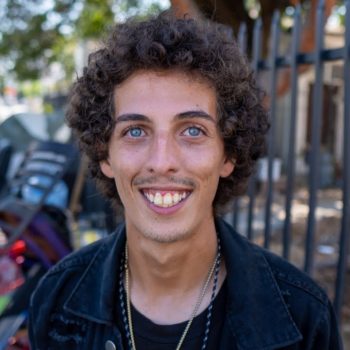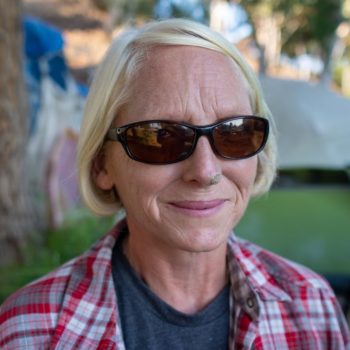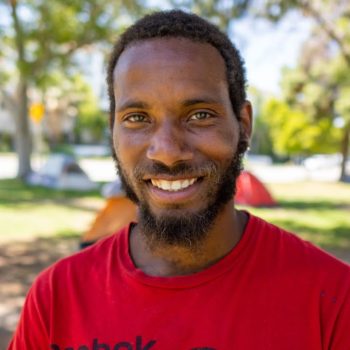
- Good Stuff -
- 5mins -
- 396 views
‘Invisible People’ gives those experiencing homelessness a platform to tell their stories
A nonprofit dedicated to educating the public about homelessness, Invisible People is a pioneer and trusted resource for inspiring action and raising awareness in support of advocacy, policy change and dialogue around poverty in North America and the UK.
How one man uses social media to give a voice to the homeless
Mark Horvath has broken the mould. He’s not doing what makes sense. He’s not doing something that even pays the bills. He is living out his passion and doing what burns deep inside of him. Mark has developed Invisible People to give a face and voice to homelessness, something he knows all too well since he once lived among them. Mark’s work is extremely innovative and his ingenious use of social media for storytelling is a model for both the corporate and not-for-profit worlds.

Invisible People imagines a world where everyone has a place to call home
Homelessness is one of the most challenging problems we face as a society, yet it’s also one of the most solvable, believes Invisible People founder Mark Horvath. The first step to solving homelessness is acknowledging that its victims are people. Regular people. Fathers. Mothers. Couples. Whole families. Ordinary people who fell on hard times and lost their core foundation of being human – their homes.
There is a direct correlation between what the general public perceives about homelessness and how it affects policy change. Most people blame homelessness on the person experiencing it instead of the increasing shortage of affordable housing, lack of employment, a living wage or the countless reasons that put a person at risk. This lack of understanding creates a dangerous cycle of misperception that leads to the inability to effectively address the root causes of homelessness.
On their homepage, Invisible People say:
‘We imagine a world where everyone has a place to call home. Each day, we work to fight homelessness by giving it a face while educating individuals about the systemic issues that contribute to its existence. Through storytelling, education, news, and activism, we are changing the narrative on homelessness.
This isn’t just talk. Each year, our groundbreaking educational content reaches more than a billion people across the globe. Our real and unfiltered stories of homelessness shatter stereotypes, demand attention and deliver a call-to-action that is being answered by governments, major brands, nonprofit organizations, and everyday citizens just like you.
However, there is more work to be done on the road ahead. Homelessness is undoubtedly one of our biggest societal issues today and will only continue to grow if we don’t take action now.’
Source: InvisiblePeople.tv



Homeless Man Poses As a Celebrity to Take Over a Luxury Hotel to Get Mayor’s Attention
Probably one of the coolest advocacy stunts we’ve ever heard of happened this past May and was pulled off by a Los Angeles homeless man who lives in a tent in Each Park and Jed Parriott, a housing advocate with Street Watch LA.
Backstory: once the coronavirus hit, governments and service providers across the US went into hyperdrive to prevent the spread of COVID-19 in the homeless community. Homeless shelters do not allow for social distancing, and since most hotels now are vacant, it makes sense to utilise empty hotel rooms to help save lives.
In April, California Gov. Gavin Newsom launched Project Roomkey to allocate emergency funds and acquire 15,000 hotel rooms, but only some homeless people would qualify for the program. Los Angeles Mayor Eric Garcetti asked hotels to volunteer their empty rooms even though he had the executive power to commandeer them. At the time this was all going down, only 1,508 people had been placed in hotel rooms.
Here’s where it gets good. Homeless Davon posed as a famous musician. Friend Jed played the role of his manager. Together with a few other friends, they created an entourage and headed to Ritz-Carlton in downtown Los Angeles.
Jed told the hotel staff they’d like to book three rooms for 10 nights, but first, they’d like to see the rooms. Once inside a hotel room, Davon shares with the concierge: “Actually, I’m not famous,” he said. “I’m homeless. I live in Echo Park. And I’m not leaving this hotel until Mayor Garcetti commandeers these vacant rooms.”
You can watch this on Davon’s Instagram here. Daily Beast wrote about it here.
Source: InvisiblePeople
Invisible People: Learn more
Watch some real stories. Share them. Educate yourself on homelessness. Catch up on the latest homelessness news. Then take action to help your community. Just one person can achieve a lot.
Invisible People is a 501(c)(3) nonprofit dedicated to educating the public about homelessness through innovative storytelling, news, and advocacy. Since launch in 2008, Invisible People has become a pioneer and trusted resource for inspiring action and raising awareness in support of advocacy, policy change and thoughtful dialogue around poverty in North America and the United Kingdom.

